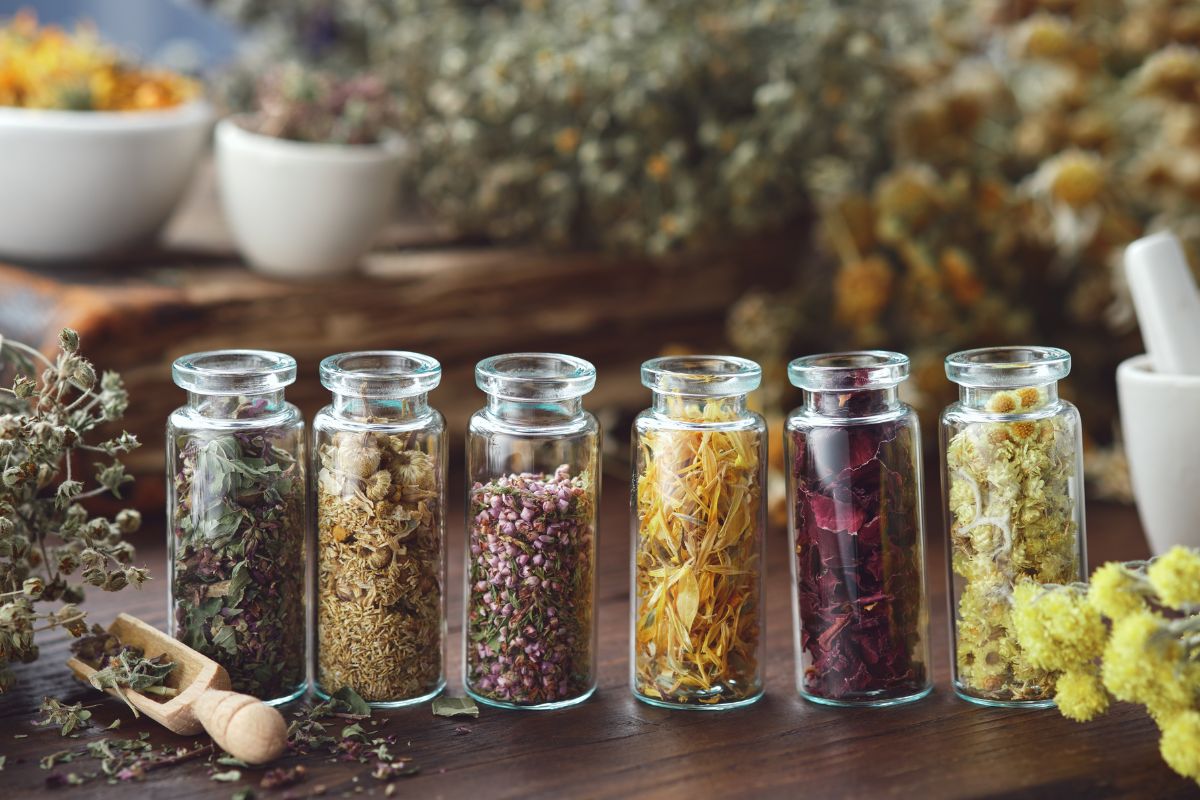Have you ever woken up with that annoying ache in your back or knees and thought, “Again, body?” Yeah, inflammation might be behind way more than we think. But don’t worry! Before running to the medicine cabinet, how about giving nature’s wisdom a chance?
In this article, I’ll show you 10 medicinal herbs that fight inflammation naturally – and the best part: in a way that’s simple, effective, and with the kind of care that only nature knows how to give.
🌿 Why Should You Care About Inflammation?
Have you noticed how some aches just become part of daily life? That stiffness in the morning, the lingering pain in your shoulder, or that constant feeling of bloating… A lot of people think it’s just “normal with age,” but it’s not that simple. These could be signs of chronic inflammation – a type of inflammation that, unlike the acute kind (like when you sprain your ankle or get a fever), sticks around for weeks, months, or even years, often without clear warning signs.
Chronic inflammation is like a small fire constantly burning inside the body – quiet, but damaging. It can be triggered by a variety of factors: diets high in processed foods, long-term stress, lack of sleep, a sedentary lifestyle, or even pollution. Over time, this “internal fire” wears down tissues and organs, making it easier for illnesses like arthritis, diabetes, Alzheimer’s, and even certain cancers to develop.
More than just an immune response, chronic inflammation has become a modern health issue. We live life in fast-forward, often disconnected from the body’s subtle messages. That’s why understanding and addressing inflammation is so important — not just for those who are already dealing with illness, but for anyone looking to prevent future health problems. The good news? Our bodies are smart and respond really well when we start taking care of them the right way.
That’s where medicinal herbs that fight inflammation come in. These herbs are natural, safe, and have been trusted for centuries across different cultures. With powerful active compounds, they help regulate the body’s inflammatory response, ease discomfort, and sometimes even treat the root of the issue. And the best part? You can easily incorporate them into your daily routine — in teas, meals, oils, or even baths. It’s about getting back to our roots and rediscovering the healing power of nature.
🌱 1. Turmeric (Curcuma longa)
If there’s a superstar among natural anti-inflammatories, it’s turmeric. With its bold yellow color, turmeric contains curcumin – a compound proven to fight inflammation at the cellular level. It’s especially helpful for joint pain, arthritis, and digestive issues.
You can use it as a spice in your meals, mix it into smoothies, or try the popular “golden milk.” I love adding a pinch to rice — it gives color, flavor, and that little healing boost. Just a tip: always combine it with black pepper to increase the absorption of curcumin!
🌿 2. Ginger (Zingiber officinale)
Ginger isn’t just a tasty spice – it’s a powerhouse when it comes to reducing inflammation. Rich in gingerols and shogaols, it offers anti-inflammatory, antioxidant, and even mild pain-relieving effects. It’s great for muscle aches, arthritis, and menstrual cramps, and it also improves digestion and blood circulation.
In my house, we never skip ginger tea when someone’s sore or feeling under the weather. Sometimes I mix it with lemon and honey — not only does it taste amazing, it feels like a warm hug for your body. Once you get used to it, ginger becomes a must-have in your daily routine.
🌼 3. Chamomile (Matricaria chamomilla)
Chamomile is mostly known for calming the nerves and helping with sleep, but it’s also a gentle anti-inflammatory. Its flavonoids and azulene compounds help soothe the stomach, ease cramps, and reduce digestive inflammation.
Honestly, just making a cup of chamomile tea feels therapeutic. On stressful days or when my stomach’s upset, it’s my go-to comfort ritual. And it’s not just for drinking — chamomile also works wonders as a skin compress or added to bath water for a relaxing soak.
🌿 4. Rosemary (Rosmarinus officinalis)
Besides being a flavor booster in the kitchen, rosemary is packed with anti-inflammatory and antioxidant compounds like rosmarinic acid and carnosol. It’s helpful for joint pain, digestive issues, and even respiratory inflammation. Plus, it supports brain health and memory!
I love making rosemary tea when I need mental clarity or adding a sprig to bathwater after a long day. It smells amazing and brings an instant sense of peace. And if you can grow it at home — even better! It’s one of those herbs that keeps on giving.
🍃 5. Nettle (Urtica dioica)
Yes, that same plant that can cause itching when touched raw — but once dried or cooked, nettle becomes a nutritional and healing gem. It’s rich in iron, calcium, magnesium, and anti-inflammatory compounds like quercetin.
Nettle tea or supplements can work wonders for joint pain, fluid retention, and detoxifying the body. I’ve seen people experience real relief from chronic knee pain with daily use. Just be sure to use it properly — once prepared the right way, it becomes a true ally for your health.
🌱 6. Peppermint (Mentha piperita)
That cooling, fresh feeling you get from peppermint? It’s not just in your mind. Peppermint contains menthol and rosmarinic acid, which help relieve headaches, bloating, cramps, and respiratory discomforts.
In my house, peppermint tea is a daily staple. It helps with digestion and lifts the mood, too. You can also add it to fruit juices or salads for an extra touch of freshness. It’s one of those herbs that brings lightness to both body and mind.
🍯 7. Green Propolis
Not technically an herb, but it deserves a spot here. Brazilian green propolis, made by bees from a plant called Baccharis, is loaded with artepillin C — a powerful anti-inflammatory and antimicrobial compound. It’s especially helpful for respiratory infections and sore throats.
The taste? Strong. But I’ve grown to love it. I usually add a few drops to water or juice when my immunity feels low. It’s nature’s immune booster in a bottle — and it’s seriously effective.
🌿 8. Cinnamon (Cinnamomum verum)
Besides smelling like warm memories, cinnamon is packed with cinnamaldehyde, which helps regulate inflammation caused by high blood sugar and oxidative stress.
I sprinkle it on oatmeal, coffee, fruit… It adds flavor and supports the body at the same time. It also improves digestion and warms the body — perfect for cozy moments on cold days.
🌼 9. Fennel (Foeniculum vulgare)
Fennel’s sweet, gentle scent is already soothing, and its benefits go far beyond taste. Rich in anethole, fennel helps relieve bloating, gas, and stomach cramps caused by digestive inflammation.
I love having fennel tea after a heavy meal or on days when my gut feels off. It’s also calming and works beautifully in blends with chamomile or mint. A small but mighty helper for daily wellness.
🌿 10. African Basil (Alfavaca – Ocimum gratissimum)
Also known as clove basil or alfavaca in Brazil, this herb is full of eugenol — an anti-inflammatory and antimicrobial compound. It’s often used in teas for sore throats, coughs, and sinusitis relief.
I like to grow it at home, and whenever someone in the house starts sniffling, out comes the alfavaca tea with a bit of honey. It’s gentle, comforting, and surprisingly effective. Once you try it, it becomes part of your natural medicine kit.
Living with constant inflammation shouldn’t be the norm, even though many people accept chronic pain and fatigue as a part of getting older. The truth is, your body is always trying to tell you when something’s out of balance. By bringing in medicinal herbs that fight inflammation, you give your body a chance to heal naturally, kindly, and effectively — without the harsh side effects of synthetic drugs.
What’s beautiful about this process is realizing that nature is all around us — sometimes just sitting quietly in a tea box or growing on the windowsill. These herbs don’t ask for much: just a little time, consistency, and an open heart. With a simple brew, a sprinkle of spice, or the scent of fresh leaves, we reconnect with something ancient and healing.
So, if you made it this far, maybe this is your sign to begin. Pick one or two herbs from the list, try them out, listen to your body. Health doesn’t have to come in a pill — sometimes, it’s waiting for you in a warm cup of tea, ready to remind you that self-care can be simple, natural, and deeply nourishing.
🌿 Want to dive deeper into the world of medicinal herbs? Check out this article from Verywell Health featuring 20 powerful healing herbs and their uses: Healing Herbs: A Guide to 20 Healing Herbs and Their Uses. It’s definitely worth the read!

Sam Bright is a passionate researcher of the power of medicinal plants and their benefits for health and well-being. With years of study and practice in the use of therapeutic herbs, he is dedicated to sharing accessible, evidence-based knowledge on how nature can support health holistically.
Through his blog, Sam explores everything from the traditional uses of plants to modern scientific discoveries, always with a practical and informative approach. His goal is to help people integrate herbal medicine into their daily lives in a safe and effective way.

